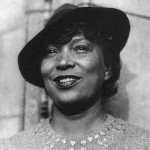Ships at a distance have every man’s wish on board.
Zora Neale Hurston Quotes
It would be against all nature for all the Negroes to be either at the bottom, top, or in between. We will go where the internal drive carries us like everybody else. It is up to the individual.
Similar Quotes
The big artist keeps an eye on nature and steals her tools.
- Thomas EakinsThe writer is by nature a dreamer - a conscious dreamer.
- Carson McCullersNature is usually wrong.
- James McNeill WhistlerNature has planted in our minds an insatiable longing to see the truth.
- Marcus Tullius CiceroFor the mind disturbed, the still beauty of dawn is nature's finest balm.
- Edwin Way TealeComments on: "Zora Neale Hurston Quotes: It would be against all nature for all the Negroes to be either..."

| Birth: | 7th January, 1891 |
| Death: | 18th January, 1960 |
| Nationality: | American |
| Profession: | Anthropologist, Folklorist, Novelist, Writer |
Zora Neale Hurston was an American folklorist, anthropologist, and author during the time of the Harlem Renaissance. Of Hurston's four novels and more than 50 published short stories, plays, and essays, she is best known for her 1937 novel Their Eyes Were Watching God.
Hurston was the fifth of eight children of John Hurston and Lucy Ann Hurston. Her father was a Baptist preacher, tenant farmer, and carpenter, and her mother was a school teacher. She was born in Notasulga, Alabama on January 7, 1891, where her father grew up and her grandfather was the preacher of a Baptist church. Her family moved to Eatonville, Florida, the first all-Black town to be incorporated in the United States, when she was three. Hurston said she always felt that Eatonville was "home" to her and sometimes claimed it as her birthplace Her father later became mayor of the town, which Hurston would glorify in her stories as a place where African Americans could live as they desired, independent of white society. In 1901, some northern schoolteachers visited Eatonville and gave Hurston a number of books that opened her mind to literature, and this may be why she sometimes describes her "birth" as taking place in that year. Hurston spent the remainder of her childhood in Eatonville, and describes the experience of growing up in Eatonville in her 1928 essay "How It Feels to Be Colored Me".
In 1918, Hurston began undergraduate studies at Howard University, where she became one of the earliest initiates of Zeta Phi Beta Sorority and co-founded The Hilltop, the University's student newspaper. While there she took courses in Spanish, English, Greek and public speaking and earned an Associate's Degree in 1920. In 1921 she wrote an essay which qualified her to become a member of Alaine Locke's literary club, The Stylus. Hurston left Howard in 1924 and in 1925 was offered a scholarship to Barnard College where she was the college's sole black student. Hurston received her B.A. in anthropology in 1927, when she was 36. While she was at Barnard, she conducted ethnographic research with noted anthropologist Franz Boas of Columbia University. She also worked with Ruth Benedict as well as fellow anthropology student Margaret Mead. After graduating from Barnard, Hurston spent two years as a graduate student in anthropology at Columbia University.
Related Authors
Advertisement
Today's Anniversary - 19th January
Births
- 1963 - Martin Bashir
- 1942 - Michael Patrick Smith
- 1850 - Augustine Birrell
- 1954 - Katey Sagal
- 1947 - Paula Deen
Deaths
- 2005 - Walter Wriston
- 2011 - Wilfrid Sheed
- 1982 - Leopold Trepper
- 1729 - William Congreve
Quote of the day
Popular Topics
About Quoteswave
Our mission is to motivate, boost self confiedence and inspire people to Love life, live life and surf life with words.


Share with your friends